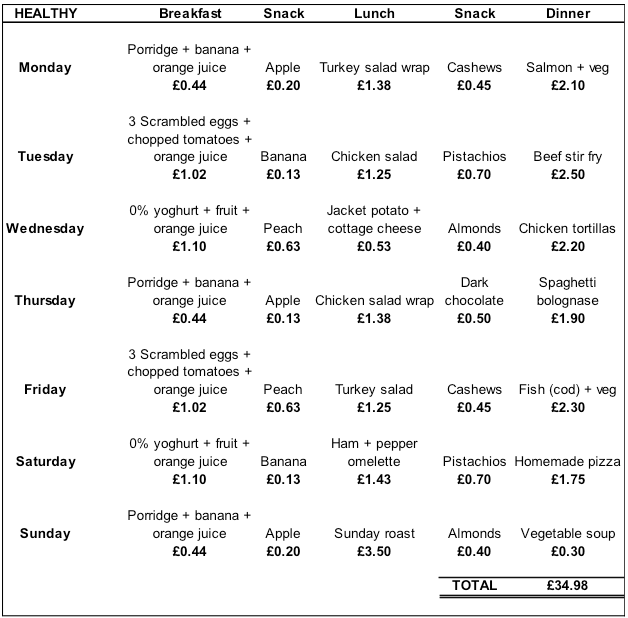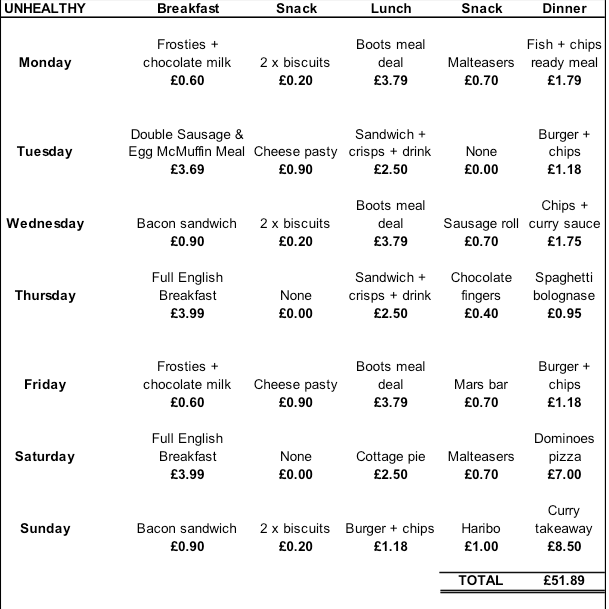Today we have a guest post from a fellow blogger, Graham from Money Stepper.
People often cite the cost of eating well as being the reason they don’t do it. “A salad box from Pret-a-Manger costs £5.00 or I can get a sandwich and sausage roll for £2.00 from Greggs”. This is something I just don’t buy into (forgive the pun).
What is more expensive?
I would say the scale looks something like this:
HEALTHY FOODS < UNHEALTHY FOODS < “HEALTH” FOODS
There is a clear difference between healthy and health foods.
- Healthy foods are those which you can purchase at a reasonable price which are healthy (fresh fruit, fresh vegetables, nuts, healthy meats etc).
- “Health foods”, on the other hand, are those which are created by the industry at a premium price which are advertised as being “healthy” (think about innocent smoothies, packaged salads, fancy dried fruit & nuts).
I’m willing to accept that health foods are more expensive that cheap, unhealthy food. However, I am sure that healthy foods are cheaper than unhealthy alternatives.
This is for two main reasons:
- When you eat healthy foods, you tend to eat less
- When you eat healthy foods, you tend to make these yourself from scratch than buying products from shops, takeaways, cafes and restaurants
Real life examples
To prove this point, I have included two sample weeks below. The first is eating well, where all foods are bought from supermarkets and prepared yourself at home. The second is eating poorly, which includes a mix of buying food from high street stores, fast food outlets, takeaway deliveries, etc etc.
From this example, the cost of eating healthily is 33% cheaper than eating poorly.
You can see that the main contributors of this are the expensive takeaways and lunches purchased from shops.
Cause vs effect
When it comes to budgeting and eating well, it should be your diet which comes first. If you focus on what you eat and ensure that you have each meal planned during the week, the savings will come.
When considering the example provided earlier, we made the comparison of a prepared salad from a high street store for £5 and the Greggs sandwich and sausage roll for £2.00.
However, this isn’t the true comparison.
The sandwich and sausage roll for £2 should be compared to the chicken salad wrap prepared from scratch at home. This more fair comparison has the healthy option at £1.38, a significant percentage less than the sandwich and sausage roll.
The trick is to plan
Planning => Eating healthy => Saving
Not planning => Eating unhealthily => Spending a little more
OR
Not planning => Eating “health” foods => Spending lots more
Without planning, there is no way you can be both healthy and wealthy!




It’s sad how businesses promote so many of their products as being “healthy” now when they really aren’t. It’s just that consumers don’t know what ingredients are/are not healthy. I also think that one reason that we think eating healthy is so much more expensive is because of how large our portion sizes are. I was away overseas and regularly ate an appetizer, my meal and had a desert every day. I lost weight. All three of these were still less food than the typical American dish! In fact, when I came back, I couldn’t even eat all of the food that was on my plate at a restaurant here. The point is, we need less food than we think to sustain ourselves.
Coming from the UK, I can say that the US is famous for their portion sizes. While this is a treat for us visiting on holiday, it really isn’t doing much for the obesity crisis in the US.
I completely agree that the key is the plan ahead and buy healthy food in advance.
Definitely planning healthy meals and eating at home is less expensive than eating unhealthy food – and eating out more. I think there is a misconception that eating health is more expensive because it’s confused with “health foods” like you mention. More education and marketing needs to be done on what healthy foods really are.
I think planning is one of the things that tripped me up when I was in college. It was hard to save money and eat healthy when I was working nearly full-time as well as taking a full class load. It’s become much easier to eat healthy (and not overpay for it) now that I have a full-time job and can plan out meals and purchases.
I totally agree! We eat healthy for cheap ($300 or less for a family of 5) because we cook from scratch and have a garden full of organic produce that we eat, freeze, can, and dehydrate.
Thanks for working to clear up the misconceptions that healthy foods are not affordable!
Excellent point. Also, healthy meals prepared at home from scratch using healthy ingredients will save money in health care expenses in the long run.
Great point Kurt. People overlook the long-term cost of not looking after themselves!
It’s really amazing how much time and money a little planning can save all over the place. There’s a high cost to being lazy… not just with food. Great post!
Learning is cook is good, learning to cook healthy is great!
I think I eat mostly “healthy” foods, with a few minor health foods mixed in. Sometimes I probably do pay a little more for convenience (like bars and products like Gu). But I’d still rather spend more and have good health than spend a lot less and eat processed foods. It’s so sad to hear about “food deserts” that don’t offer low cost, quality food so people eat cheap crap.
Great job differentiating healthy foods from “health” foods. Eating healthy doesn’t have to be expensive!
I think another thing to consider is the health costs that come into play later on. Granted those are a lot harder to put onto a spreadsheet. I think we can agree though that someone who eats like crap is going to have more expenive medical bills later in life than someone who spent more (because of lack of planning) to eat healthy. it reminds me a saying I heard: “You can pay the farmer now, or you can pay the doctor later”.
I love that saying. Definitely stealing that one Micro!! 🙂
Healthy food does not have to cost more. I eat a lot of salads and reduce the amount of meat. I also have at least one day a week where we have a vegetarian meal.
Planning is key to eating healthy. If you buy the raw ingredients and make your own stuff, not only do you save more money, but you’re probably making a healthier choice.
Eating healthy can be cheaper than eating unhealthy, and I think a part of this is that people will pay for convenience. That being said, it’s not just the cost of food today that matters, it’s also the longer-term costs that people will pay when regularly consuming unhealthy food. As in, medical issues, less ability to work, etc. It’s better to eat healthy not only for short-term considerations, but also long-term.
Great post. I agree with you that meal planning/planning ahead with your coupons can save you so much! And it’s important to remember that the more health claim a food product makes, the unhealthier it usually is.. so stay away from the processed stuff and save your money by not buying that and just buying whole, natural foods instead!
Great illustration and breakdown. I remember seeing something a while back in the NY times about how it’s actually cheaper to eat healthy verus at fast food places, and this shows the same point. Just takes a bit more work, which for me sometimes gets in the way 🙂